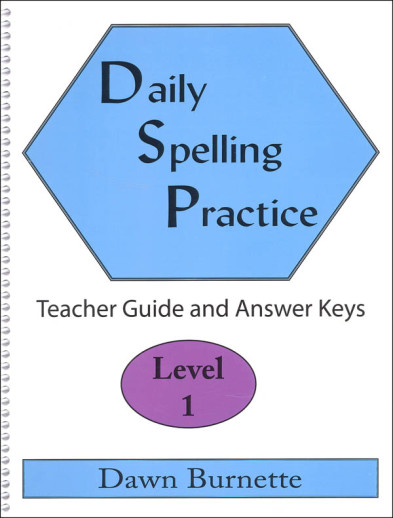We use cookies to make your experience better. To comply with the new e-Privacy directive, we need to ask for your consent to set the cookies. Learn more.
Daily Spelling Practice Level 1 Teacher Guide
If you teach students how to spell a word, they'll spell it correctly on Friday. But if you teach them how to spell, they'll spell every word correctly every day.
Daily Spelling Practice teaches students to spell by focusing on sound keys, addressing prefixes and suffixes, working with syllables, and providing practice with spelling confusables and rule-breaking memory words.
Students can begin the four-year program as early as second grade or as late as ninth grade. Because it is a process that builds from beginning to end, students need all four levels to gain a complete understanding of spelling. As an alternative, the one-year intensive is appropriate for students in middle and high school. Because concepts build on each other throughout all four levels of Daily Spelling Practice, all students should start with Level 1. Older students may use the One-Year Intensive instead of the four-year program.
Each of the four levels presents 25 different spelling keys (one per week) and includes five interspersed review weeks. The one-year intensive includes 180 different lessons. Regardless of which approach you choose, the method takes just a few minutes each day and is effective with or without workbooks.
Learning to spell is a process. The author, Dawn Burnette, who has brought this systematic process to both grammar and reading, has set out to conquer spelling. The result? A four-year program that focuses on a weekly sound key, addresses prefixes and suffixes, works with syllables, provides practice with spelling confusables and lastly, rule-breaking memory work. Consistency - and perhaps simplicity - is the key to this program. Each level covers 25 different sound keys, numerous adding-on rules (affixes and syllables), 25 different spelling confusables, and five interspersed review levels. Weekly lessons follow a consistent pattern for five weeks followed by a review lesson with pre and post tests for the beginning and ending of each level. The emphasis is long-term memory. Before starting Level 1, a student must know the sound of each individual letter and have some reading experience - as early as 2nd grade but can begin later, even as late as 5th or 6th grade. After that (or for an older student), consider using the one-year intensive course. Students need ALL four levels so if you don't have enough school years left to work through all levels, consider using the one-year intensive course.
There are two program components: a Student Workbook and the Teacher Guide and Answer Keys. It's possible to do the program without the Student Workbook but you will need to be prepared to do more "blackboard" writing and for your student to do more notebook writing. Most will find the Student Notebook worth the price. The Student Workbook has weekly workpages (one page per week) that provide space for the student to write. The week's lessons start with the sound key and target words along with new words using the sound key along with the memory word. Tuesday practices the methods of adding-on. Spelling Confusables (don't you just love that satisfyingly appropriate term?) are covered on Wednesdays by working with a pair of such words: writing definitions of each and using correctly in sentences. On Thursday, workbook practice is identifying correctly spelled words from lists of words. Assessments are given on Friday but these are not the sort you study for. They are designed to determine if the student has internalized the week's work. The Teacher Guide provides a complete program overview, the weekly lessons (with answers filled in), suggested Friday assessment words, and a scope and sequence for the program.
One might be inclined to look at the seemingly skimpy Student Workbooks and conclude that this is a lightweight program. You would be wrong. The secret here is consistency and internalizing some very important spelling concepts. For students to be successful spellers, they must learn and practice the sound keys, read and notice the keys while reading; break down words into syllables, and engage in writing on a daily basis. Teacher Guides are 50 pgs, spiral-bound. Student Workbooks are 30 pgs, pb, three-hole punched.
The One-Year Intensive is a type of "greatest hits" program for older students. It's fast-paced and intensive. There are 180 lessons that cover the same types of content as the four-year program: sound keys, memory words, confusable sets, adding-on rules, and review. Like the four-year program, the Student Workbook provides the daily lessons with space to write and the Teacher Guide provides a program overview and answers. ~ Janice
| Product Format: | Paperback |
|---|---|
| Brand: | DGP Publishing |
| Grades: | 1-12 |
| Length in Inches: | 11 |
| Width in Inches: | 8.625 |
| Height in Inches: | 0.125 |
| Weight in Pounds: | 0.4 |

